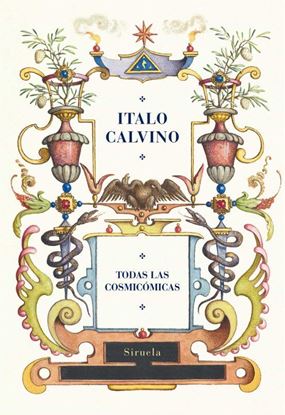

TODAS LAS CARTAS
Clarice Lispector vivió casi dos décadas en el extranjero y mantuvo una larga y fructífera correspondencia con sus círculos profesionales y familiares. A pesar de afirmar que «no sabía escribir cartas», estas resultan en realidad una aventura tan fascinante y creativa como sus deslumbrantes novelas, cuentos y crónicas, ya que Lispector también hace gala en ellas de su infalible inspiración, humor y lirismo.
Todas las cartas, que reúne la correspondencia escrita por la autora brasileña a lo largo de toda su vida, constituye un corpus fundamental para comprender su trayectoria personal y literaria. El material, organizado por décadas de 1940 a 1970, va acompañado de notas que lo contextualizan en términos de tiempo y lugar, que además incluyen sustanciosas referencias culturales.
2,900
TODAS LAS COSMICOMICAS
Yo quisiera servirme del dato científico como de una carga propulsora para salir de los hábitos de la imaginación y vivir incluso lo cotidiano en los confines más extremos de nuestra experiencia; en cambio me parece que la ficción científica tiende a acercar lo que está lejos, lo que es difícil de imaginar, y que tiende a darle una dimensión realista». Italo CalvinoEn este volumen se reúnen todas las cosmicómicas, relatos en los que su autor asumió el divertido deber de aligerar los arduos conceptos de la ciencia contemporánea, y creó así un género más próximo a los mitos cosmogónicos que a la ciencia ficción. Según sus propias palabras: «Muchos críticos han definido estos cuentos míos como un nuevo tipo de ficción científica.
1,500
TODAS LAS FAMILIAS FELICES
Siempre supe que mi madre estaba loca. La novela más impactante de Hervé Le Tellier, autor de La anomalía.
Un destacado escritor francés se adentra en su propia historia en esta elocuente reflexión sobre las relaciones familiares disfuncionales.
Hervé Le Tellier no se consideraba a sí mismo como un niño infeliz. Y, sin embargo, entendió desde muy joven que algo andaba mal. Alcanzados los setenta años de edad y con la distancia emocional que facilita el paso del tiempo, Le Tellier se sintió capaz de escribir la historia de su familia.
Abandonado temprano por su padre y criado en parte por sus abuelos, se vio profundamente afectado por la relación con su madre, una mujer con problemas y con percepciones dañinas sobre el amor.
En este relato perspicaz y profundamente personal, Le Tellier intenta recordar tiempos difíciles sin ira ni arrepentimiento y, a veces, incluso con humor.
995
TODAS LAS FIESTAS DE MAÑANA. PUENTE 3
Colin Laney, la persona más sensible del mundo a los patrones de información, vive en la actualidad en una caja de cartón en Tokio. Mientras el cuerpo le tiembla a causa de sueños febriles, su mente viaja libre como siempre, y sabe que algo está a punto de ocurrir. No en Tokio, y no será algo que él llegue a ver. Algo está a punto de ocurrir en San Francisco.
La neblina hace que sea más fácil ocultarlo, si eso es lo que se quiere, y la realidad de aquel lugar parece tambalearse incluso en sus mejores momentos.
Un hombre misterioso avanza con elegancia a través de esa neblina y deja cadáveres a su paso, tantos que una acumulación de ausencias hace que Laney sienta su presencia. Un chico llamado Silencio no habla, pero sí que revisa a toda velocidad páginas web de información cibernética en busca de un objeto con el que se ha obsesionado. Y Rei Toei, la idoru japonesa, continúa su análisis de todo lo humano. Ella no es humana, al menos no a la manera tradicional, pero intenta conseguirlo. Y, en la neblina de San Francisco, en aquel momento tan extraño de la historia, quién puede afirmar lo que es posible y lo que no…
800
TODAS LAS MADRES ME ODIAN
Florence Grimes siempre toma las peores decisiones. Soltera, sin dinero y frustrada tras el humillante final de su carrera musical, lo único que la motiva para levantarse de la cama todas las mañanas es Dylan, su hijo de diez años. Hasta que Alfie Risby desaparece misteriosamente durante una excursión con el colegio y Dylan se convierte en sospechoso. Por primera vez en su vida Florence tiene que hacerse cargo de una tarea y cumplirla hasta el final: debe encontrar a Alfie y limpiar el nombre de su hijo si no quiere perderlo para siempre. El único problema de Florence es que todas las madres del colegio la odian. Y por si fuera poco, tiene razones para pensar que tal vez Dylan no es tan inocente como a ella le gustaría creer.
1,450
TODAS LAS NOCHES QUE FUIMOS HUMO
Una historia de amor para dos cuerpos.
El poemario Todas las noches que fuimos humo trata de una historia de amor que transcurre en una habitación de hotel en la Gran Vía madrileña en el espacio de una noche de verano.
Los dos protagonistas se citan para cenar al caer el sol y se despiden a primera hora de la mañana siguiente cuando amanece.
Esa noche ambos pasan por diferentes estados de ánimo, algunos compartidos y otros secretos, y se entregan a lo que sucede debajo de las sábanas: lo íntimo, lo privado, el deseo, la soledad, el miedo y la ternura.
950














